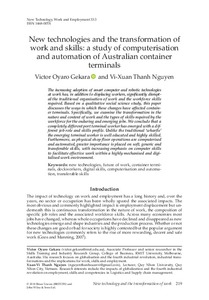New technologies and the transformation of work and skills: a study of computerisation and automation of Australian container terminals

Oyaro Gekara, Victor ; Thanh Nguyen, Vi-Xuan
New Technology, Work and Employment
2018
33
3
November
219-233
automation ; computerization ; docker ; skill requirement ; transferable skill
Technology
https://doi.org/10.1111/ntwe.12118
English
Bibliogr.
"The increasing adoption of smart computer and robotic technologies at work has, in addition to displacing workers, significantly disrupted the traditional organisation of work and the workforce skills required. Based on a qualitative social science study, this paper discusses the ways in which these changes have affected container terminals. Specifically, we examine the transformation in the nature and content of work and the types of skills required by the workforce for the enduring and emerging jobs. We conclude that a completely different port terminal worker has emerged with a different job role and skills profile. Unlike the traditional ‘wharfie' the emerging terminal worker is well educated and highly skilled. Furthermore, as physical shop floor operations are computerised and automated, greater importance is placed on soft, generic and transferable skills, with increasing emphasis on computer skills to facilitate effective work within a highly mechanised and digitalised work environment."
Digital
The ETUI is co-funded by the European Union. Views and opinions expressed are however those of the author(s) only and do not necessarily reflect those of the European Union or the ETUI.